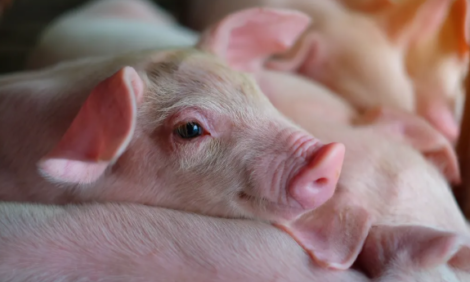



Herd Health Always an Economic Concern
Porcine circovirus type 2 (PCV2) is a common disease in some areas of the world, and while it is not so common in the US, Dr Joseph Connor, DVM, MS, president of Carthage Veterinary Service, Ltd., said that not vaccinating against the disease can have huge effects on the pig herd, writes ThePigSite senior Editor, Chris Harris.He said that vaccinating herds in harsh economic times, especially against diseases like porcine circovirus type 2 (PCV2), which can spread quickly and cause havoc in herds, is vitally important.
"Health may be the dagger right now to the industry," Dr Connor a seminar hosted by Fort Dodge Animal Health at this year's World Pork Expo in Des Moines, referring to the problems the industry has been facing because of H1N1.
"With all of the progress we've made with PCV2 and others, there are still a lot of questions and a lot of work to do," said Dr Connor.
He said that timing of the vaccination is as important as the dosage and studies had also looked at the affect that PCV2 has on reproduction. He said that in some cases an increase in abortion had been noticed and cases of mummification had occurred.
He said the optimum time for vaccination had been three to five weeks of age for weaned pigs and then gilts pre-breeding. In cases where reproduction had been affected, the sow herd had been vaccinated.
However, he warned that it was not advisable to vaccinate sow herds too much because they can pass down the antibodies.
In all of the studies Dr Connor has completed, there have been a statistical difference between vaccinated hogs and those that did not receive a vaccination in terms of herd health, viraemia (or blood infections) and co-infections.
"Pigs with PCV2 viraemia will likely increase the difficulty in controlling and eradicating PCVAD (porcine circovirus associated diseases)," Dr Connor said.
"PCV2 infection can also compromise the immune system and increase the likelihood of infection of other PCV2-associated diseases like swine influenza virus (SIV), porcine reproductive and respiratory syndrome (PRRS) and Mycoplasma."
In the studies completed by Dr Connor on Fort Dodge Animal Health's Suvaxyn® PCV2, he concluded that this vaccine provides significant protection against PCV2 and improves growth performance compared to unvaccinated pigs.
"We've had very high success with the vaccines in all the studies. We've shown in all of the studies we are comfortable vaccinating with single dose vaccines, such as Suvaxyn, at three or five weeks of age," he said.
The studies done in commercial herds in the United States, Europe, Japan and New Zealand all indicated Suvaxyn significantly reduced total mortality rate and improved growth performance.
However, Dr Connor said there is a lot more work to be done on studying viraemia and the reduction viraemia and the effects on co-infections such as PRRS and swine influenza virus (SIV).
Further Reading
| - | Find out more information on porcine reproductive respiratory syndrome (PRRS) by clicking here. |








